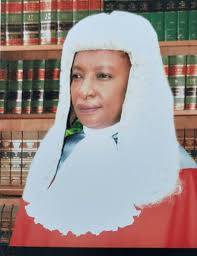From Naseer Mijinyawa Minna
The Ag chief Judge of Niger State, Justice Halima Ibrahim Abdulmalik has enumerated benefits of the domestication and implementation of the Administration of Criminal Justice Act in the State
Justice Abdulmalik spoke at a stakeholders forum on domestication and implementation of the administration of criminal Justice act, 2015 state validation public forum held at Justice Idris Legbo Kutigi International Conference Centre in Minna.
She indicated that the domestication of administration of Criminal Justice act, 2015 (ACJA),will assist in ensuring speedy dispensation of Justice in the state
Justice Abdulmalik noted that the passage of the administration of criminal Justice act, will among others address the delay in the administration of criminal Justice, decongest cases in courts and checkmate corruption in the Judiciary.
She called on the Niger State House of assembly to hasten the passage of the administration of criminal Justice act, noting that Niger state is among the few states yet to domesticate the ACJA.
She applauded the MacArthur foundation and the national Secretariat of the Nigerian Bar Association for their commitment to the domestication and implementation of the Administration of criminal Justice act,
Speaking earlier, the Chairman Nigerian Bar Association (NBA), Minna branch, Mallam Mohammed Abubakar El-Surur, observed that most of the laws in Niger State were obsolete as he called for speedy domestication of the act for quick dispensation of criminal Justice in Niger State.
According to him, no society can survive on obsolete laws as he urged the state house of assembly to as a matter of urgency ensure the speedy passage of the act.
Also speaking the chairman house committee on Judiciary in the Niger State House of assembly Hon. Ahmed Bello Agwara assured that the state assembly is committed to ensuring the speedy passage of the ACJA act in the state.
He disclosed that the ACJA bill has passed the second reading and already at the committee level adding that the house committee on Judiciary will soon call all stakeholders for public hearing for onward passage of the act.
In his remarks at the forum the Dean faculty of law University of Jos, Prof. Alphonsus Alubo,(SAN) observed that the passage of the Administration of criminal Justice act (ACJA) will assist in bringing succour to the criminal Justice system in Niger State and the criminal Justice in the nation’s judiciary system.
He noted that the domestication of the act will among others remedy convictions of offenders explaining that instead of convicting an offender the conviction will be placed on hold thereby decongesting the correctional facilities across the country.
Prof. Alubo expressed Concern over the increasing proportion of inmates on awaiting trial across the correctional facilities in the country describing the trend as unhealthy for the criminal Justice system in the country.
He insisted that the ACJA if domesticated in the nation’s legal system it will go a long way in ensuring the speedy dispensation of Justice “in our courts and reducing cases in courts”
He suggested that the office of the Attorney General and Commissioner Of Justice in the country should take over the prosecution of cases in the lower courts of competent jurisdiction than allowing police to prosecute cases noting that “if police must prosecute in court, the police must have to be a lawyer”




